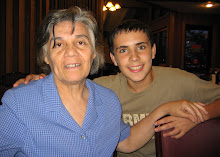And wherever they may bide,
Sonidos Serranos
Sonidos Serranos: Sounds of the Sierras...
Reflecting some of my family's interests: God's wonderful creation (especially mountains and hills!), music, and language...
Reflecting some of my family's interests: God's wonderful creation (especially mountains and hills!), music, and language...
Psalm 121:1-2 (NASB)
I will lift up my eyes to the mountains;
From where shall my help come?
My help comes from the LORD,
Who made heaven and earth.
From where shall my help come?
My help comes from the LORD,
Who made heaven and earth.
30 August 2018
“Prayer for Children”
Father, hear us, we are praying;
Hear the words our hearts are saying.
We are praying for our children.
Keep them from the powers of evil,
From the secret, hidden peril,
From the whirlpool that would suck them,
From the treacherous quicksand pluck them.
From the worldling’s hollow gladness,
From the sting of faithless sadness,
Holy Father, save our children.
Through life’s troubled waters steer them;
Through life’s bitter battle cheer them.
Father, Father, be thou near them.
Read the language of our longing;
Read the wordless pleadings thronging,
Holy Father, for our children.
And wherever they may bide,
And wherever they may bide,
Lead them home at eventide.
[Amy Carmichael’s 19th century prayer for children in the Dohnavur Fellowship in India]
Labels:
encouragement,
philosophy,
prayer,
salvation,
sorrow
23 August 2018
Receta para flan (¡de lujo!)
Porque a veces necesitas “algo más” (¡y especialmente cuando te arrancaron una muela!)
Puede (¡o debe!) acompañarse con dulce de leche.
Ingredientes:
12 cucharadas de azúcar
6 huevos (grandes)
1 cucharadita de vainilla
1 taza (250 cc) de leche (entera)
1 taza (250 cc) de crema doble
[dulce de leche, para acompañar]
Elaboración:
Colocar 6 cucharadas de azúcar en una cacerolita y llevar a fuego – bien bajo – hasta que se derrita.
Distribuir el caramelo en una fuente (preferiblemente de vidrio) y dejar enfriar.
Aparte, batir 6 huevos ligeramente (con batidora a velocidad media) hasta quedar espumosos.
Agregar 1 cucharadita de vainilla.
Agregar 1 taza (250 cc) de leche entera y 1 taza (250 cc) de crema doble, batiendo hasta quedar espumoso.
Colocar la preparación en la flanera acaramelada, ya fría.
Llevar el flan a horno muy suave (150° C o 300° F) – en “baño María” – durante una hora, hasta quedar firme.
Enfriar antes de desmoldar.
¡A disfrutar!
20 August 2018
“No hay gente ordinaria...”
“No hay gente ordinaria. Nunca has hablado con un mero mortal. Naciones, culturas, artes, civilizaciones: estas son mortales, y su vida es para la nuestra como la vida de un mosquito. Pero son los inmortales con quienes bromeamos, trabajamos, nos casamos, rechazamos y explotamos –horrores inmortales o esplendores eternos–. Esto no significa que hemos de ser perpetuamente solemnes. Debemos jugar. Pero nuestra alegría debe ser de ese tipo (y es, de hecho, el tipo más alegre) que existe entre personas que se han, desde el principio, tomado en serio entre sí: sin frivolidad, sin superioridad y sin presunción”.
C.S. Lewis en El Peso de la Gloria
“There are no ordinary people. You have never talked to a mere mortal. Nations, cultures, arts, civilizations – these are mortal, and their life is to ours as the life of a gnat. But it is immortals whom we joke with, work with, marry, snub and exploit – immortal horrors or everlasting splendors. This does not mean that we are to be perpetually solemn. We must play. But our merriment must be of that kind (and it is, in fact, the merriest kind) which exists between people who have, from the outset, taken each other seriously – no flippancy, no superiority, no presumption.”
C.S Lewis in The Weight of Glory
15 August 2018
¡ÉL es todo lo que necesito!
“Ten cuidado de como intentas interpretar (darle sentido a) tu vida. Lo que parece ser un desastre podría, en efecto, ser gracia. Lo que parece ser el final puede ser el comienzo. Lo que parece irremediable (sin esperanza) puede ser el instrumento de Dios para darte esperanza real y duradera.
Tu Padre está comprometido a tomar lo que parece tan malo y convertirlo en algo que es muy, muy bueno”.
(Paul Tripp)
13 August 2018
“¡Dame el Libro de Dios!”
“He pensado que soy una criatura de un día, pasando por la vida como una flecha en el aire. Soy un espíritu venido de Dios y volviendo a Dios, suspendido sobre el gran abismo, hasta unos momentos más, ya no me ven; ¡caigo en una eternidad inmutable! Quiero saber una cosa: el camino al cielo, cómo aterrizar seguro en esa orilla feliz. Dios mismo ha condescendido a enseñar el camino; para este mismo fin vino Él del cielo. Él lo ha escrito en un libro. O, dame ese Libro a cualquier precio, dame el Libro de Dios”.
—John Wesley
“I have thought I am a creature of a day, passing through life as an arrow through the air. I am a spirit come from God, and returning to God, just hovering over the great gulf, till a few moments hence, I am no more seen; I drop into an unchangeable eternity! I want to know one thing—the way to heaven, how to land safe on that happy shore. God himself has condescended to teach the way; for this very end He came from heaven. He has written it down in a book. O give me that Book at any price, give me the Book of God.”
09 August 2018
We cling to Truth!
Tomorrow, August 10, we would be celebrating Jona’s 24th birthday. This picture was taken nineteen years ago on the day of my Mommy’s memorial service. My little buddy, Jona, didn’t understand all the implications of that day, but his tender little-boy heart knew how to comfort all the same...
[I love you, Buddy, more than ever!]
Adjustment to life without him is long and difficult... We appreciate those who pray for us as we miss him – more than ever! But we rejoice that Jona is in the presence of his Savior, whom he loved and served with joy during the sixteen and two-thirds years he was given here with us. And we look forward – more than ever – to the Day when all wrongs will be right and all tears will be forever wiped away.
Today we cling to Truth!
07 August 2018
“La justicia de Dios...”
“Anhelaba en gran manera entender la Epístola de Pablo a los Romanos y nada se interponía en el camino excepto esa única expresión: ‘la justicia de Dios’ porque entendí que significa esa justicia por la cual Dios es justo y trata justamente al castigar a los injustos. Mi situación era que, aunque era un monje impecable, me presentaba ante Dios como un pecador preocupado en su conciencia, y no tenía confianza en que mi mérito le apaciguara. Por lo tanto, no amaba a un Dios justo y enojado, sino que lo odiaba y murmuraba contra él. Sin embargo, me aferré al querido Pablo y tenía un gran anhelo de saber a qué se refería él”.
(Heme aquí: Una vida de Martín Lutero, p 65)
“Cuando, por el Espíritu de Dios, entendí las palabras, cuando aprendí cómo la justificación del pecador procede de la misericordia gratuita de nuestro Señor por la fe . . . entonces me sentí nacer de nuevo como un hombre nuevo. . . . En verdad, este lenguaje de San Pablo fue para mí la verdadera puerta del Paraíso”.
(La vida y los tiempos de Martín Lutero, pp 55-56)
06 August 2018
“¡El Peso de la Gloria!”
“Si hoy les preguntaras a veinte hombres buenos cuál pensaban que era la más alta de las virtudes, diecinueve de ellos responderían: el Desinterés-Propio. Pero si le hubieras preguntado a casi cualquiera de los grandes cristianos del antaño, te habría respondido: el Amor. ¿Ves lo que ha sucedido? Un término negativo ha sido sustituido por uno positivo. El ideal negativo del Desinterés-Propio lleva consigo la sugerencia no principalmente de asegurar cosas buenas para los demás, sino de vivir uno mismo sin ellas, como si el abstenerse y no la felicidad de ellos fuera el punto importante. No creo que esta sea la virtud cristiana del Amor. El Nuevo Testamento tiene mucho que decir sobre la abnegación, pero no sobre la abnegación como un fin en sí. Nos dice que nos neguemos a nosotros mismos y que tomemos nuestras cruces para que podamos seguir a Cristo; y casi cada descripción de lo que finalmente encontraremos si lo hacemos contiene una apelación al deseo. Si en la mayoría de las mentes modernas acecha la noción de que desear nuestro propio bien y fervientemente anhelar el disfrute de él es algo malo, propongo que esta noción se ha infiltrado desde Kant y los estoicos y no tiene nada que ver con la fe cristiana. De hecho, si consideramos las evidentes promesas de recompensa y la asombrosa naturaleza de las recompensas prometidas en los Evangelios, parecería que nuestro Señor encuentra que nuestros deseos, no son demasiado fuertes, sino demasiado débiles. Somos criaturas desganadas, jugueteando con la bebida y el sexo y la ambición cuando se nos ofrece el gozo infinito, somos como un niño ignorante que quiere seguir haciendo tartas de barro en un cantegril porque no puede imaginar lo que significa la oferta de unas vacaciones en la orilla del mar. Somos demasiado fáciles de complacer”.
C.S. Lewis en El Peso de la Gloria
C.S. Lewis en El Peso de la Gloria
“If you asked twenty good men to-day what they thought the highest of the virtues, nineteen of them would reply, Unselfishness. But if you asked almost any of the great Christians of old he would have replied, Love. You see what has happened? A negative term has been substituted for a positive. The negative ideal of Unselfishness carries with it the suggestion not primarily of securing good things for others, but of going without them ourselves, as if abstinence and not their happiness was the important point. I do not think this is the Christian virtue of Love. The New Testament has lots to say about self-denial, but not about self-denial as an end in itself. We are told to deny ourselves and to take up our crosses in order that we may follow Christ; and nearly every description of what we shall ultimately find if we do so contains an appeal to desire. If there lurks in most modern minds the notion that to desire our own good and earnestly to hope for the enjoyment of it is a bad thing, I submit that this notion has crept in from Kant and the Stoics and is no part of the Christian faith. Indeed, if we consider the unblushing promises of reward and the staggering nature of the rewards promised in the Gospels, it would seem that our Lord finds our desires, not too strong, but too weak. We are half-hearted creatures, fooling about with drink and sex and ambition when infinite joy is offered us, like an ignorant child who wants to go on making mud pies in a slum because he cannot imagine what is meant by the offer of a holiday at the sea. We are far too easily pleased.”
C.S. Lewis in The Weight of Glory
C.S. Lewis in The Weight of Glory
02 August 2018
“Celebrating Life!”
Because life is just too short not to...
“Happy Half Birthday, Little Lady!”
And the longer I
live, the more I realize that the trials of this life help me appreciate the
value of pausing to celebrate this life.
Thankful... 💙
Subscribe to:
Posts (Atom)






